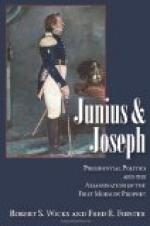CHAPTER XIII.
When Susannah was returning from her parting with Ephraim Croom, she found Joseph Smith was walking slowly upon the road not far from John Biery’s hotel. He was holding a small book open before his eyes, conning a lesson, repeating the words aloud again and again as a schoolboy might.
“It has been given to me to see that the Lord hath need of the learning of this world, Mrs. Halsey. When I have got the Latin and the Greek, I shall try to find some man who can teach me the Egyptian language, that I may know how far the ancient Egyptian from which I translated the Book differs therefrom.”
Susannah had expected to find him excited after the events of the past night, but instead he was intent only upon committing a portion of the Latin grammar to memory, learning by rote as children did in those days.
“My husband told me,” she began. She stood in awe of Smith, hardly knowing how to express herself to him; then she went on, almost roughly, “I don’t see how Newell Knight could have gone up in the air and come down again; it does not seem to me sensible.”
He clasped his hands behind his back, his large thumb holding his place open in the lesson-book, and walked beside her, his head bent somewhat forward in reverie.
“I am often much taken aback at what happens to me now, Mrs. Halsey, but I do declare to ye that that was the greatest wonder I ever saw before my eyes; and it’s given to me to see that ye’ve got the same sort of difficulty about him as it’s natural for me to have.” He began to lapse in his own dialect. “Ye want to see the reason why of things. Well, I tell ye, I’ve just got down to this point, that I’ve give up tryin’ to see why. If ye come to that, why was I chosen to lead this people? I tell ye when the words of the interpretation of the Book began to pour through my mind, and I’d no power to stop them, and I just felt as if I could cry like a baby when I couldn’t get any one to write ’em down—I tell ye, I used often to ask why. But it ain’t no use. What I’ve got to do is jest to get hold of the guiding that comes to me as clear as I can, and jest walk straight along those lines.”
She was returning with a heart bruised with the pain of the recent colloquy at parting, but full too of purpose, feeling that she owed it to Ephraim to reconsider the evidence for Smith’s prophetical claim. She glanced shrewdly at him as he walked and spoke—young, blue-eyed, large, and mild. The man seemed to her harder to comprehend if his word was disbelieved than if it was believed. On either supposition her understanding faltered.
“It is very hard for me to believe these things, Mr. Smith. It is very hard for me to believe, for instance, about the gold plates. How could they appear only to you and vanish again? It doesn’t seem to me reasonable.”




